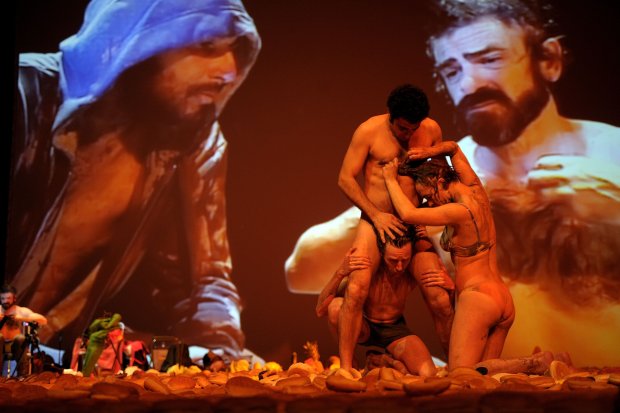
Golgota Picnic was pulled from a the Malta Festival in Poland after religious groups leveled threats.
The Polish theatre scene has been rocked by controversy since late June after the cancellation of Golgota Picnic, a show by the Argentinian theatre maker Rodrigo Garcìa that had previously aroused protest in France.
The play’s supposedly blasphemous content meant that Michał Merczyński, director of the Malta Festival, had pulled the headline show of his festival a week before its scheduled performance. The Malta Festival in Poznań is Poland’s answer to the Edinburgh Festival, and I was visiting with other directors from the Young Vic to learn more about Polish theatre culture. Our experience of the festival was derailed by claims and counter claims of blasphemy and censorship.
Merczyński’s decision to pull the show was based on information that a protest of 50,000 was planned and advice from the police that they could not guarantee the safety of the audience or the performers. The festival’s decision enraged large parts of secular Poland’s cultural elite, who feared that the police warning represented the state’s acquiescence to unofficial censorship by a group of interests centred upon the increasingly powerful Catholic church.
In reaction to the cancellation, there was a proliferation of protest screenings and staged readings of Golgota Picnic in theatres across Poland, some of which were variously picketed by a loose coalition of Catholics, neo-nazis and football hooligans. At the protest screening my group attended, at TR Warzsawa in Warsaw, these three groups all appeared to be embarrassed by each other. They prayed together and held placards warning that “Poland, motherland of Saint John-Paul II must not be a latrine for the trashes of the blasphemer, of the scoffers, of the traitors, of the barbarian and pseudo-artists”.
The Young Vic directors were jostled as we attempted to get in to the theatre and through the double cordon — first the protesters trying to stop us getting into the theatre, and then the police holding back the protesters. In the end we climbed over a low fence around a corner to get in and the police quickly bundled us into the building.
It’s important to say that this was much more exciting than it was scary. Here was evidence that theatre matters: people threatening hostility, if not quite violence, in response to an artwork. As far as I could make out from the DVD, Golgota Picnic (screened in Spanish with Polish subtitles) was a considered and beautiful meditation on the body and on Christ’s body in particular. Although it included a scene where a woman playing Jesus sculpted her gelled hair over another person’s genitalia, I’ve certainly seen more blasphemous plays. The crowd outside were fairly audible in their hymns and their chants, but — in the end, the protesters were defeated by the length of a piece of theatre. When we emerged two and a half hours later, they had given up and gone home.
The cancellation of Golgota Picnic left the Malta Festival deflated, but it felt as if these protests might be a powerful shot in the arm for Polish theatre culture in general. Several people we met were excited by the possibilities of the networks created and issues raised in the fight against religious censorship. Polish theatre provided a central political role in the end years of communism, and then lost its way only to be reinvented at the end of the nineties as a means to interrogate more universal themes in the formally explosive theatre of Gzegorz Jarzyna, Krzystof Warlikowski and Jan Klata, directors who still dominate the scene. It appears that Polish theatre is ripe for a new generation to redefine what theatre means.
As an outsider, this culture war looked complex and unhappy. Of course I was inside the theatre rather than on the street with a rosary, but it was clear that all the theatre people we met were well educated and well heeled. The Catholic protesters were not, and they felt like a demographic who had been left behind by the neo-liberalism that has replaced communism. It’s hardly surprising that these people are angry to see that “they are mocking us”, as one man complained to us on the steps of TR Warszawa.
It’s worrying to encounter theatre censorship in the EU, and artists should be free to present their work. At the same time, theatre institutions have a responsibility to ensure each piece of work finds its audience in the most productive way possible. With Golgota Picnic, the Malta Festival imported a show that had already caused protests elsewhere. Their marketing presented it as sexily controversial, and when this spectacularly backfired they cancelled the performance. Artists should shock and offend, but theatre makers and producers have to tread thoughtfully to ensure that the presentation of powerful work doesn’t play into the hands of those who would censor it.
Jeff James’s visit to Poland was supported by the Adam Mickiewicz Institute, the Young Vic and the Jerwood Charitable Foundation.
This article was posted on July 30, 2014 at indexoncensorship.org





